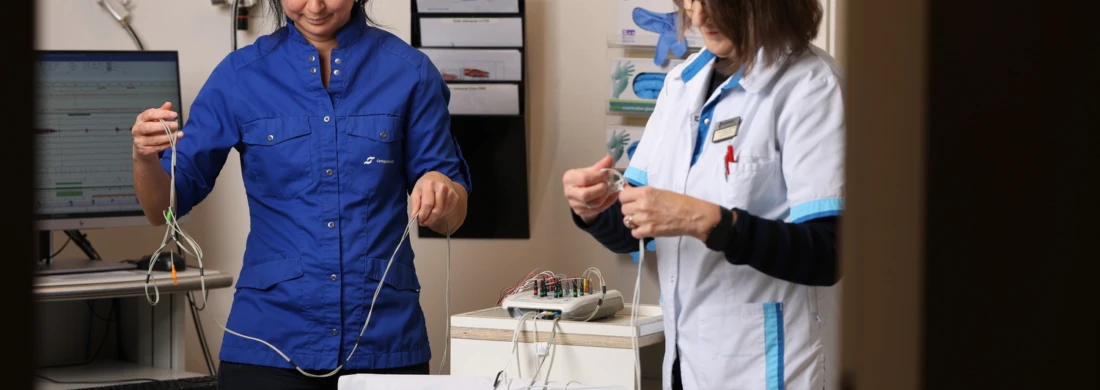Children referred to the Center for Sleep Medicine at Kempenhaeghe typically suffer from a complex sleep problem.
In some cases, multiple factors or conditions contribute to the sleep disorder. Therefore, various specialists are involved in the child's care: a pediatrician or pediatric neurologist specializing in sleep disorders, a psychologist, and/or a behavioral therapist are part of the treatment team. If needed, social work and educational home guidance are also available.
The multidisciplinary approach at the Center for Sleep Medicine focuses on both the medical and psychosocial consequences of the sleep disorder.
Sleep-related breathing disorders in children
Obstructive sleep apnea (OSA) also occurs in children, often associated with obesity or following an adenotonsillectomy (removal of the tonsils and adenoids). The Center for Sleep Medicine provides specialized diagnostics and treatment for children, using adapted sensors and techniques.
Treatment options may include CPAP therapy (with intensive guidance), positional interventions, or a mandibular repositioning appliance (MRA). This type of care often requires a short-term hospital stay for optimal support.
Neurological sleep disorders in children
Neurological sleep disorders in children include:
- Central hypersomnia: Conditions such as narcolepsy and idiopathic hypersomnia also occur in children but often present differently than in adults. Early recognition is essential due to the impact on development and learning. Treatment focuses on symptom management, often involving medication and multidisciplinary support.
- Restless Legs Syndrome (RLS): In children, RLS may manifest as sleep difficulties, such as trouble falling or staying asleep. Treatment is adapted based on experience in adults, as there is limited medical evidence for pediatric cases.
- Parasomnias: These are abnormal behaviors during sleep, such as sleepwalking, nightmares, and REM sleep behavior disorder. Parasomnias in children require specific diagnostics (polysomnography with video monitoring) and treatment.
Chronic insomnia in children
Chronic insomnia in children is common, especially during puberty and adolescence. The Center for Sleep Medicine has developed an adapted form of Cognitive Behavioral Therapy for Insomnia (CBT-I) that aligns with the developmental stage of children. Comorbid psychiatric conditions are often present. We collaborate with mental health services (GGZ) to treat these children.
Behavioral insomnia in children
In behavioral insomnia, sleep problems in children are often maintained by their behavior and parental responses. The Center for Sleep Medicine provides intensive behavioral support for children in whom previous treatments have been ineffective.
Circadian rhythm disorders in children
Circadian rhythm disorders in children, such as Delayed Sleep Phase Syndrome (DSPS), are common during puberty and adolescence. This can cause difficulties in going to bed on time and waking up early, affecting school performance and daily functioning. Treatment at the Center for Sleep Medicine includes chronotherapy and light therapy, possibly supported by medication or melatonin.
